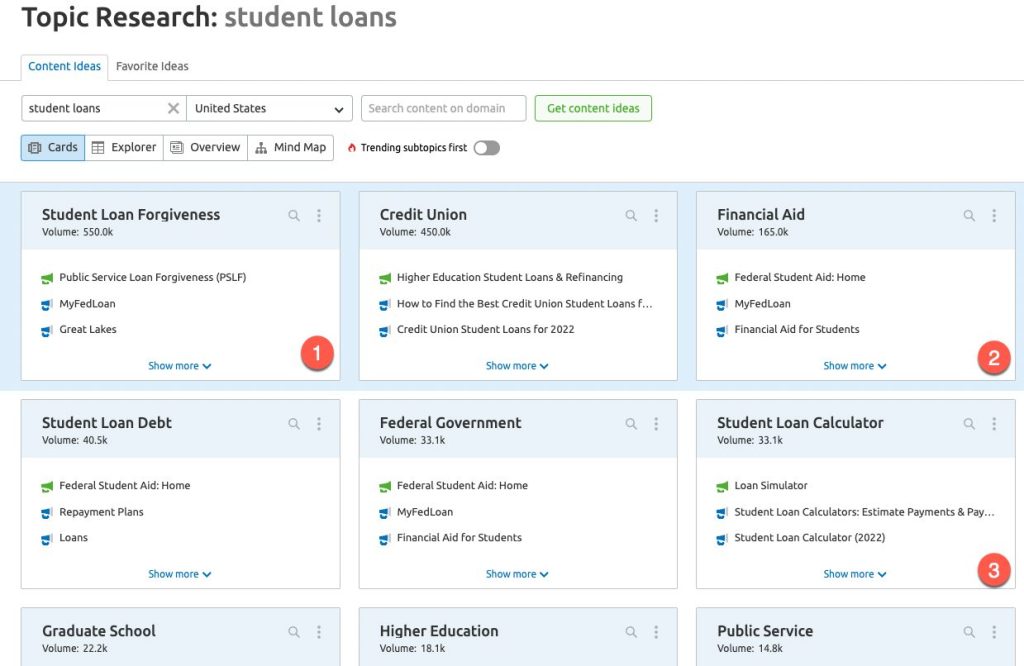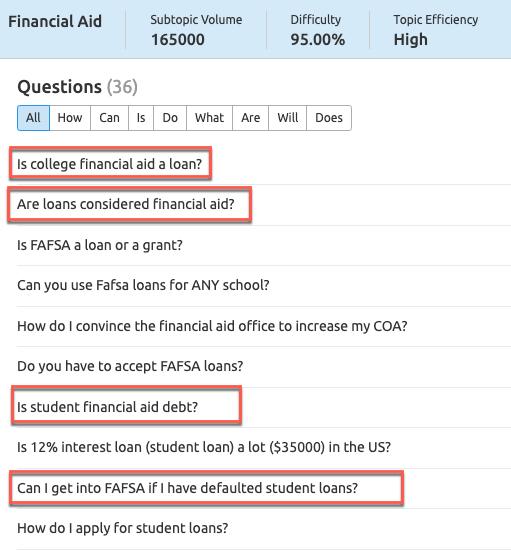If you are planning to write any content, you need to know what keywords your audience is using. With the right keywords, you can get more traffic and leads.
But, it's not that easy to find the right keywords for your content marketing strategy.
In this article, we'll show you how to identify the right keywords for your content and how to use them in order to increase traffic and leads.
Choose A Topic That You Are Passionate About
If you're passionate about a certain topic, it will be easier to write content about it. This will make your content more credible and valuable to your readers.
They will also think that you know what you're talking about and they'll trust your opinion. This will increase the likelihood of them following you on social media as well as sharing your content with their friends and family.
It's also important to choose a topic that you can easily research and learn about. If you're passionate about something, it will be easier to write about it.
Don't Choose A Topic That You Know Nothing About
If you choose a topic that you know nothing about, it will be hard for you to create high-quality content for your readers.
They will think that your content is not worth reading and they might even think that your business is spammy.
Choose A Topic That Your Audience Is Passionate About
You can also use the same keywords that your audience is using. This will help you generate more traffic and leads for your business.
Choose A Topic That Is In Demand
It's also a good idea to choose a topic that is in demand. This will help you get more leads and sales for your business as well as increase the conversion rate.
Choose A Topic That Has High Traffic Potential
If you choose a topic that has high traffic potential, it will be easier for you to get your content shared on social media platforms.
Choose A Topic That Has Good Competition
If you choose a topic that has good competition, it will be easier for your readers to find the information that they are looking for. This means that you'll get more leads and sales for your business.
If there is high competition, you should use an article pre-fix like “how-to”, “why-to”, or “what-to”.
Choose A Topic That Will Help You Grow Your Business
If you choose a topic that will help you grow your business, it will be easier for you to generate more leads and sales for your business.
This is especially true if you have a blog that will help your business to grow. It's also important to choose a topic that will make your customers think about their problem and need.
Choose A Topic That You Can Write About Regularly
This will help you generate more traffic to your website.
For example, if you're passionate about photography, you can write about it on a regular basis and post photos from time to time.
You should choose a topic that is in demand for your business. If you choose a topic that isn't in demand for your business, you won't be able to generate traffic and leads for your business.
The more you write about a topic, the more traffic and leads you will get for your business. It's also important to write about topics that your audience is interested in.
You should choose a topic that your readers are passionate about as well.
Important Things That You Can Do To Hone Your Content And Increase Engagement
There is nothing more frustrating for a blogger than to spend hours creating a great piece of content and then, after publishing it, finding that no one is reading it. The problem is that while your posts are probably ranking high on Google, they're not converting into actual sales.
The reason? You're not targeting the right keywords.
What is keyword research?
Keyword research is a word or set of words that are used by web searchers on search engines. It can be anything from a short keyword like “dogs” to a long-tail keyword “latest news for Facebook turning into Meta”.
According to Microsoft Word users, searching for something like “dog collar” results in nearly 300 possible keyword matches. However, search engines have advanced algorithms of word association programs, to narrow down those choices considerably.
With the use of algorithms based upon statistical analysis of large amounts of text, search engines can isolate specific sets of key phrases. These so-called “seed keywords,” once identified, serve as guiding points for further searches.
We will talk in detail about seed keywords in a few paragraphs below.
In addition to determining seed keywords, keyword research usually involves analyzing competitors' sites and comparing similar websites against each other to figure out what works best.
Keyword research helps you understand what your audience is searching for
There are several ways to begin researching relevant keywords, including typing related topics into popular search engines, examining competitor pages, conducting interviews, observing current trends, and consulting industry experts.
Once potential keywords have been gathered, market analysts will narrow the list down according to two criteria: relevancy and popularity.
Keyword research helps you understand what your audience wants to read
Relevance refers to whether or not users actually type in a given phrase instead of another term that contains fewer syllables.
Keyword research helps you understand what your audience wants to buy
Popularity takes into account the number of competing sites dedicated to various subjects.
To maximize traffic, it's important to balance both factors.
Gather Your Seed Keywords
Step 1: Use SEMRUSH to Discover Topics for Your Content
You can use SEMRUSH to discover the topics that are relevant to your keyword. With SEMRUSH, you can also see what the competition is up to and discover what's working for them.

Here's how it works: You enter a keyword into the search box, and it will return a list of top-ranking topics for that term. In the first example, we searched for the keyword “student loans” and found a number of useful blogs and websites to read.
Right away, I know that potential visitors are:
- Looking to see if the loans will have long-term financial consequences (i.e., loan forgiveness)
- Dealing with added complexity in that it's not just a loan but part of the financial aid system (so just think how confused and frustrated your audience is)
- Trying to figure out how much it's going to cost them!
We can dive deeper by seeing how the tool breaks down the subtopic “financial aid”:

What do these questions tell us about our audience?
They are confused.
This means you should:
- Create content from multiple angles to deal with all the various confusions that come with this topic
- Format the content to speak in a way that makes things really easy to understand
Step 2: Read Related Blog Posts and Websites
Read all of the posts on each website, looking for keywords that they're using in their titles, tags, and body content. This is an easy way to start finding topics for your content.
For example, if you're writing about social media marketing, look at the blogs and websites that are ranking high in the SEMRUSH search results for the keyword “student loans”
Step 3: Find Similar Keywords and Continue Learning From Them
As you continue reading through the blogs and websites you found in step 1, read through the posts and find the keywords that are ranking highly for similar terms. You can use SEMRUSH to do this, by entering “+” into the search box to create a keyword match.
For example, if you're writing about social media marketing, enter the keyword “student loans” into the search box and see what it brings back. You can see a list of blogs and websites with high-ranking pages for “student loans” in the first example.
Expand On Your Seed Keywords
The Seed Keywords are the keywords that you want to rank for, and they need to be in your page title, meta description, and your page content.
These keywords will serve as the basis of your SEO efforts. They're also what will help you find new leads through search engines.
They're often overlooked when it comes to building a website because they are so important, but when it comes time to rank for certain keywords, those words must be included in the page title, meta description, and page content.
Use Google Adwords Keyword Planner
You can use the keyword planner to find keywords that are related to your website, which will help you in two ways.
First, it will show you what keywords your competitors are ranking for, which gives you ideas for where to focus your efforts and helps with future keyword research.
Use Google Trends
When you're looking for keywords to rank for, you can use Google Trends to find the current searches and trends for your target keywords.
This tool will give you a good idea of what kind of traffic your site is receiving and how it's performing. It can also help you avoid keywords that are not being searched for at all, which means they are not worth spending time ranking for.
Use Google Autocomplete
When you're looking to rank for keywords, the autocomplete tool can be a great way to find new keyword ideas.
You can use it to get suggestions for keywords related to your target keywords and see what people are searching for. You can use this information as ideas for where you want your website to go and how you want it to look.
Use Google Correlate
This tool can help you find keywords that are related to your target keywords. When you're searching for new keywords to rank for, this tool is a great way to find new ideas and get new traffic.
You can use it to see which words are most closely related to your target keyword and then rank for those words.
Use Google Suggest
Google Suggest is a tool that can help you find new keyword ideas. It will give you suggestions of related terms and words that are closely related to your target keywords. You can use it to get new ideas for what kind of content you should be creating and where you want to focus your efforts.
Do your research
If you have no idea what keywords to use for your content marketing strategy, it's better to do some research first. There are plenty of tools that can help you with this task.
Use a keyword research tool to find the most popular search terms related to your topic.
You can also use Google Trends and Google Adwords Keywords Tool to find the most popular search terms.
Make a list of all the keywords that you find.
Once you have a list, it's time to start writing. Use the keywords that you found in your research as well as any others that you think are relevant to your topic. It's also a good idea to add some keyword variations (for example, adding an article prefix like “how-to” or “how-to make money online”) in order to increase the number of search results.
Use the same keywords in all of your content marketing strategies.
If you're writing about one topic, it's better to use the same keywords in all of your content. This will help you increase the credibility and reliability of your content as well as make it easier for readers to find it.
Use them in your content marketing strategy
It's not enough to choose a topic and then write about it. You also need to use it in your content marketing strategy.
For example, if you're writing about how to make money online, you should include some tips on how to make money online as well. Otherwise, people will think that you're just a spammer and that your content marketing strategy will not work.
Don't be afraid to use the same keywords that you found in your research. You can also use them as anchor texts in your links. This will help you improve the ranking of your content on search engines.
Use them in your blog posts
If you use the same keywords in your blog posts, they will be more effective. This will also make it easier for readers to find your content and follow you. They'll also think that your content is more credible and valuable.
Use them in your emails.
You can also use the same keywords in your email marketing messages. This will help you generate more leads and sales for your business as well as increase the conversion rate.
Content Writing
After selecting keywords, copywriters can focus their attention on crafting well-written articles geared toward attracting visitors.
With the SEO Writing Assistant by SEMRUSH, you can assess and optimize your content as you write, while also ensuring it's original and adopts the right tone of voice.
The SEO Writing Assistant is a free service that helps you to write for the search engine. It helps you to check your content and structure as you write, and provides a few suggestions on how to improve your writing.
You can also use this tool in conjunction with the SEMRUSH Content Planner (a paid service) to help you plan your content before you write it.
SEO Writing Assistant Features:
Allows you to see the keywords, phrases, and sentences you are using in your content.
Provides suggestions on how to improve your writing, including things like replacing certain words with synonyms. It also provides a suggestion if your writing is too formal or not enough formal.
You can compare the original text with the suggested text for each suggestion, and see how many times each keyword appears in both versions. This helps you to make sure that the keywords you want to use are included as often as possible.
The SEO Writing Assistant also provides a “content rating” that shows how easy it is to understand the content you are writing.
As you write, you can use the tool to see how many times your sentences and paragraphs are read. You can also check if your content is complete, and whether or not it is original. The tool will alert you if any of these issues are detected.
Create Content From Multiple Angles To Deal With All The Various Confusions That Come With The Topic
You can use the SEO Writing Assistant to write from different angles to address all the different problems you might encounter when writing about a topic.
As well as being able to add multiple keywords, phrases, and sentences for each angle, you can also add a new ‘theme' and a corresponding paragraph for each angle. You can then use this tool to help you create content from these angles that is original and high-quality.
All Keywords, Phrases, and Sentences Are Automatically Assessed As They Are Added.
As you add keywords, phrases, and sentences to the tool, they are automatically assessed for how important they are.
You can also view the rankings of each keyword, phrase, or sentence as you add them. This helps you to see which ones you should be focusing on when writing your content.
Conclusion
Choose a topic that has good competition, and high traffic potential, and will help you grow your business. It's also important to choose a topic that you are passionate about.
If you're passionate about something, it will be easier for you to write high-quality content for your readers.
For more business tips, check out our blog section and subscribe to our weekly newsletters.


